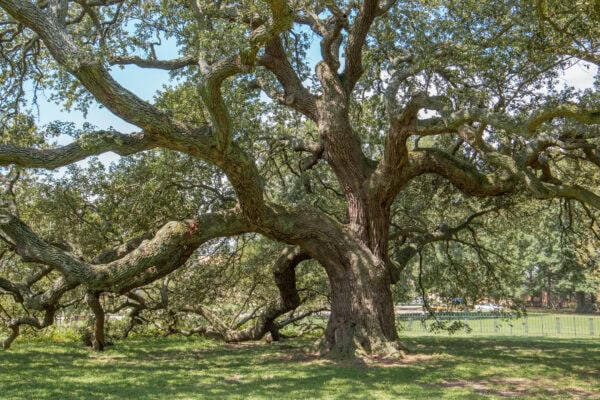On Saturday, January 6, 2024, Thavolia Glymph becomes the 140th president of the American Historical Association, the first Black woman to hold that honor. The Peabody Family Distinguished Professor of History and professor of law at Duke University, past president of the Southern Historical Association, and recipient of an abundance of academic awards, she currently holds the 2023–24 Rogers Distinguished Fellowship in 19th-Century American History at the Huntington Library. Glymph takes office at a time when the Association is working to broaden the definitions of historical scholarship, advocating for the teaching of honest history in the K–12 classroom, and more. Perspectives recently sat down with her to find out more about the president-elect’s life, career, and priorities for her term as AHA president.

The Hampton University emancipation oak, on the campus where Thavolia Glymph discovered a passion for economic history. Erik Soderstrom/Wikimedia Commons/CC BY-SA 4.0
Attending Hampton University, a historically Black college founded in 1868, was “clarifying” for Thavolia. It was her first encounter with original historical research, archival collections, and the true breadth and depth of historiography, but no less importantly, it’s where she took classes taught by Alice Davis. Thavolia remembers Davis as a no-nonsense instructor not much older than herself, recently discharged from the military, who introduced her to the joys of research and the work of historian Harold D. Woodman. It was in Davis’s class, Thavolia says, that she first realized what kind of research she wanted to do. The idea that she might have a career as a history teacher may have started there.
Woodman’s work, particularly his journal article “The Profitability of Slavery: A Historical Perennial” (Journal of Southern History, 1963), was formative for Thavolia’s conception of what history was and what great historical writing and analysis looked like. The article led her to Woodman’s book King Cotton and His Retainers: Financing and Marketing the Cotton Crop of the South, 1800–1925 (1968) and a determination to study with him at Purdue University. There, under his guidance, she trained as an economic historian specializing in the 19th-century South and social history. Economic history forms a thread, sometimes subtle, in her work, and she identifies as an economic historian as much as a scholar of slavery and emancipation. Occasionally, this self-identity surprises those familiar with her work, but she insists that “economic history must perforce be about people.” After all, telling the story of a person’s history is inevitably telling about how they experience work and about their economic lives, which determine so much of their social lives. Thavolia points out that her primary interest is in telling how economics impacts human lives, and in spaces where we tend less to look for it.
How does one write about people and events with too-little documentation?
The actual execution of that task is tricky, she admits, whether writing about people who left many written records or especially those who left few. How does one write about people and events with too-little documentation? How much ambiguity or how many unknowns can historians—particularly those used to an abundance of data—tolerate? These are questions that other scholars have debated and continue to study. Like the vagaries of the archives, categories of analysis can exhibit inexplicable traits. Thavolia also thinks about how categories of analysis can be equally tricky and sometimes overdetermine what and how we write. In writing economic history, she thinks about how “categories of analysis like class and race are sometimes asked to take on more weight than they can bear.” This can happen, she thinks, when the investigation of social class assumes that there is such a thing as “the poor” or “the proletariat,” but these categories—while they may make us more comfortable linking together otherwise unrelated people, or make it easier to do so—are more discrete than we often imagine them to be. Just because two people share impecunity does not necessarily mean they share everything. “Once you put people in a class,” Thavolia notes, “they can become easier to study and harder to see.”
Thavolia brings that economic lens to the history of the 19th-century United States, particularly the fields of Southern history, labor history, and women’s history. Her first book, Out of the House of Bondage: The Transformation of the Plantation Household (Cambridge Univ. Press, 2008), reconceptualized the Southern plantation household as a site of gendered production, labor, and racial violence, tracing through the experiences of enslaved women and their female enslavers the household’s transformation from the antebellum era through the Civil War and into the postwar. Her most recent book, The Women’s Fight: The Civil War’s Battles for Home, Freedom, and Nation (Univ. of North Carolina Press, 2020), won numerous awards, including two AHA prizes: the Albert J. Beveridge Award in the history of the United States, Latin America, or Canada from 1492 to the present and the Joan Kelly Memorial Prize in women’s history and feminist theory.
At Duke, Thavolia teaches courses on slavery, the Civil War, and Reconstruction, and she enjoys mentoring scholars who are at the start of their professional careers. Her undergraduate students have won prestigious awards and currently are making wonderful contributions through their research and writing to the Duke Institutional History Project that she leads. In her teaching, she emphasizes primary sources and historiography. She wants students to understand through experience both the joys and the disappointments of original research, to understand that writing is hard work that takes practice over time and, for most, longer than a semester. She trains graduate students at Duke and has served on preliminary examination and dissertation committees for students at other institutions, many of whom she continues to work with as they move on to postdoctoral fellowships and first jobs. She considers this work and the conversations she has with junior scholars about their research as some of the exciting and rewarding aspects of her career.
When not at work, these days Thavolia can be found on the tennis court (as her knees allow) or in her garden, which has moved mainly to her patio and focuses now on growing herbs and flowers. Fruits and veggies, she says, take too much careful attention, time she would rather devote to other things now.
Above all else, Thavolia insists that there was no light bulb moment that made her who she is today, and being interested in history as a child does not lead one inevitably to the professoriate. It was and remains “an improbable journey,” not a direct path. As president of the AHA, she will work to support the many important existing initiatives and encourage future efforts that aim to ensure that the work of historians is seen and heard not only by other scholars but by the larger communities we serve and those we still need to serve who are waiting for us to see them.
She wants students to understand through experience both the joys and the disappointments of original research.
Our interview concluded with a question that has become a Perspectives staple: Which three people, living or dead, would you most like to have over for a dinner party? Thavolia chose Toni Morrison, Barbara Fields, and Darlene Clark Hine. Hine was integral to the founding and theorization of Black women’s history. Morrison, as novelist, theorist, and student of history, has given us “precise language to understand Black life across time and space,” a “concise evocation” of enslaved and free people’s lives; Thavolia often enjoys rereading her work. Thavolia would invite Fields, who has carved out a path of excellence in her work and whose learned work, like Morrison’s, models clarity and precision in language and thought. She considers Fields one of the nation’s greatest historians. Thavolia often returns to Fields’s Washington Post op-ed “So You Want to Be a Historian” (1991) when teaching or writing and to her large body of work on race and ideology. And making room for an extra seat or two at the table, she would invite Gerda Lerner and Nikky Finney. She credits Lerner for her bravery and audacity in promoting women’s history and Finney as one of the most perceptive chroniclers of Black life in the South writing today. Ira Berlin would also be there.
And despite her own achievements, Thavolia remains modest about her career. Her last instruction to this interviewer? “Pretend this never happened.”
This work is licensed under a Creative Commons Attribution-NonCommercial-NoDerivatives 4.0 International License. Attribution must provide author name, article title, Perspectives on History, date of publication, and a link to this page. This license applies only to the article, not to text or images used here by permission.



